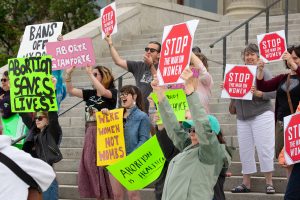The United States Supreme Court overturned the 1973 landmark Roe v. Wade ruling earlier last month, ending the constitutional right to abortion in the country. The court’s highly controversial decision has sent shockwaves across the U.S. and throughout the world, prompting condemnation from Western leaders and praise from religious figures such as the Pope.
In Vietnam, a country with the world’s second-highest abortion rates, the overturning of Roe v. Wade has sparked intense debate among the nation’s more than 70 million netizens.
A whopping 40 percent of all pregnancies end up being terminated each year in Vietnam, where access to abortion is guaranteed under Article 44 of the 1989 Public Health Protection Law – both as a measure of population control and a reflection of the country’s commitment to socialism.
With no legal restriction on abortion until the 22nd week of pregnancy – and late-term termination remaining rampant and largely unpunished – Vietnam has one of the world’s most liberal abortion laws.
However, this tolerance exists at odds with the conservatism of Vietnamese society. Several followers of Vietnamese traditional folk religion consider unborn offspring to be human beings with “living souls.” Terminated fetuses and sometimes even embryos – resulting both from miscarriage and abortion – are venerated in similar ways to how dead people are worshipped, with sophisticated rituals like burning incense and joss paper as offerings for their afterlife.
This partially explains why abortion remains highly stigmatized in Vietnam, despite being free and readily available. Many consider it, at best, bad karma and, at worst, an outright murderous act for both the woman and the doctor who performs the abortion.
Not surprisingly, pro-life rhetoric has gained considerable support not only among the Vietnamese diaspora in the United States, which has often leaned strongly Republican, but also in Vietnam itself. Across social media platforms and the comment sections of major national news outlets like VnExpress, the most “liked” comments have shown overwhelming support for reversing Roe v. Wade, with some even calling for the Vietnamese government to consider taking a similarly restrictive action.
While any radical changes to the country’s abortion laws remain unlikely, it is worth noting that the Vietnamese government has experienced manifold pressures to adopt a more restrictive stance on abortion.
With Vietnam becoming one of Asia’s fastest aging countries, the government has been keen to encourage couples to have more children. In 2020, the communist-ruled government quietly relaxed a decade-old restriction that barred civil servants and public-sector employers from having a third child. Communist party members are still limited to only two children, though this is expected to change soon, especially after its ideologically closest neighbor China pushed for a “three-child policy” last year.
Earlier last month, the Vietnamese legislature discussed a bill to further criminalize sex-selective abortion, which is common in the country due to preference for sons over daughters. The practice has led to a huge gender imbalance: Vietnam’s sex ratio of 111.5 boys per 100 girls is the third highest in the world, behind only China and India.
As such, it would be unsurprising if the Vietnamese government tightens abortion restrictions, starting with the inevitable first step of strictly enforcing the existing ban on abortion 22 weeks post-conception. A deputy committee chair of the National Assembly once condemned late-term abortion as an “immoral” and “evil” act of “murder” and called for it to be treated in a similar way to homicide. An increase in the penalty for illegal abortion – currently set at a maximum of 15 years, albeit rarely enforced – has been touted on the legislative agenda of Vietnam’s historically rubber-stamp yet increasingly powerful legislature.
One discreet yet equally effective policy that Vietnam could implement to clamp down on abortion would be to scale back abortion services, an approach allegedly embraced by China since the launch of the “three-child policy” last year. One might even make the case that the Vietnamese government has already done so. In recent years, many “centers for reproductive health” – the Vietnamese state-owned equivalents of Planned Parenthood – across the country have been downgraded and incorporated into local centers for disease control (CDCs). While the stated purpose is to streamline healthcare services, it could arguably be a thinly veiled attempt to make access to abortion less readily available – especially amidst the authorities’ renewed crackdowns on unregistered private abortion clinics.
Another more ambitious possibility, though unlikely in the immediate future, would be to scale back the eligibility criteria for abortion well below the 22nd week of pregnancy. Vietnam’s liberal abortion laws have already made it an outlier in the Southeast Asian region; neighbors Thailand and Cambodia allow abortion only during the first 12 weeks of pregnancy, while the remaining seven ASEAN countries, barring Singapore, have imposed an outright ban on abortion, permitting it only if the woman’s life is in danger. With the reversal of Roe v. Wade, the Overton window around abortion rights has further shifted, making it more likely than ever for the Vietnamese government to move towards a more restrictive stance on abortion.

































